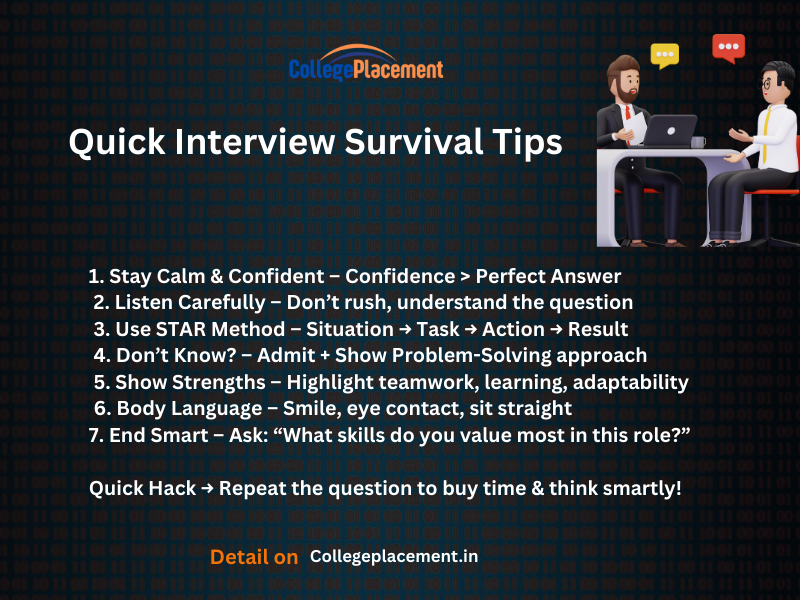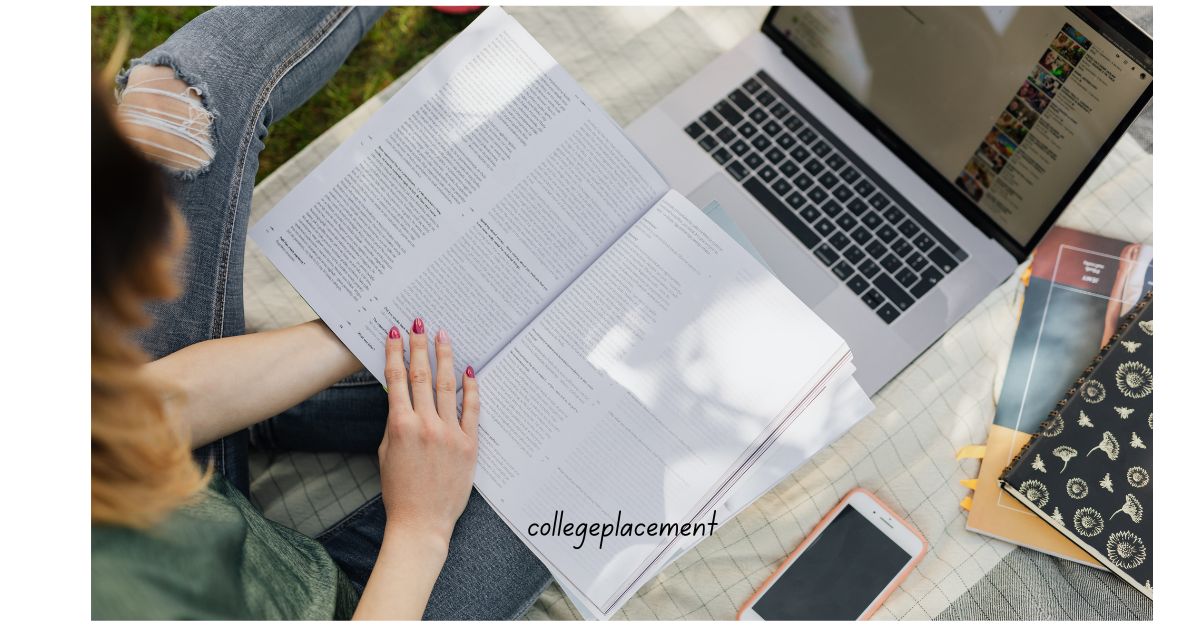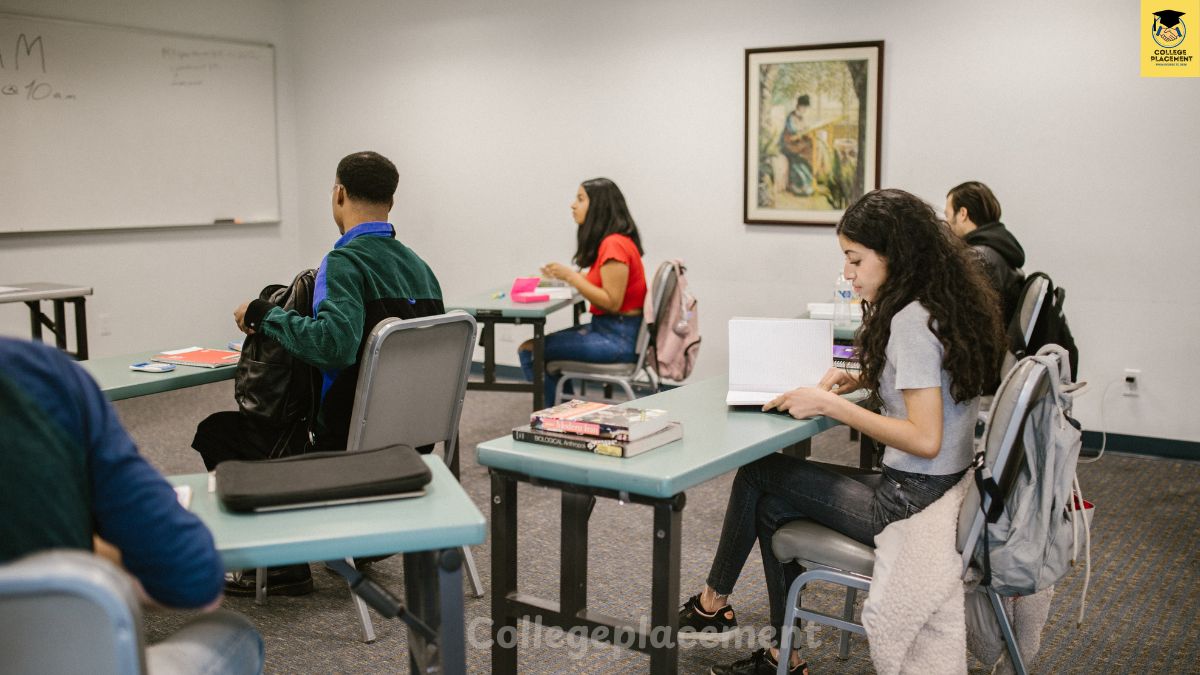Imagine this: you’re scrolling through your emails and suddenly see a reminder—“Interview tomorrow at 10 AM.”
Your heart skips a beat. You forgot to prepare.
Or maybe, life got in the way—assignments, projects, or your current job workload left you no time to revise.
Now the panic sets in: “What if they ask something I don’t know?”
Here’s the truth: you don’t need to know everything to succeed in an interview. What matters more is your ability to think on your feet, communicate well, and demonstrate a positive attitude.
In this detailed guide, you’ll learn 10 smart strategies to survive (and even excel in) an interview without preparation.
1. Calm Your Mind Before the Interview
When you’re unprepared, nerves can be your biggest enemy.
Why it matters:
- Nervousness lowers confidence.
- Recruiters notice shaky voice, fidgeting, or poor body language.
- A calm mind helps you think faster.
How to do it:
- Deep breathing: Inhale for 4 seconds, hold for 4, exhale for 4. Repeat.
- Visualization: Imagine yourself walking in confidently and shaking hands with the interviewer.
- Positive affirmation: Tell yourself: “I was called for a reason; they see potential in me.”
Quick Tip: Listen to a calming song or motivational speech just before you walk in.
2. Dress Sharp, Feel Sharp
Even if you haven’t prepared answers, you can prepare your first impression.
Why it matters:
- 55% of first impressions come from appearance.
- A professional outfit instantly adds confidence.
How to do it:
- Stick to formals or business casuals.
- Neat grooming: clean shoes, tidy hair.
- Keep accessories minimal.
Quick Tip: If you look interview-ready, you’ll feel interview-ready.
3. Use the Power of Honesty (Don’t Fake It)
Interviewers value authenticity more than a made-up answer.
Why it matters:
- If you bluff, you can get caught easily.
- Admitting gaps shows maturity.
Example:
If asked about a tool you don’t know:
Don’t say: “Yes, I’m an expert in it.” Say: “I haven’t worked much with this tool yet, but I’m eager to learn and adapt quickly.”
Quick Tip: Always pair honesty with eagerness to learn.
4. Turn Weakness into Strength
Unprepared? Highlight what you do know.
How to do it:
- Redirect to transferable skills like problem-solving, teamwork, adaptability.
- Talk about quick learning ability.
Example:
“I may not know advanced Excel formulas yet, but during my internship, I picked up basic Excel within 2 days to finish a project.”
This makes you look resourceful.
5. Use the STAR Method
When asked situational or behavioral questions, structure answers with STAR:
- Situation: Set the context.
- Task: What was required.
- Action: Steps you took.
- Result: Outcome.
Example:
Q: “Tell me about a time you solved a problem.”
STAR Answer:
- Situation: Our team project was missing deadlines.
- Task: I had to improve coordination.
- Action: I introduced a shared Google Sheet and weekly check-ins.
- Result: We finished 3 days early.
Even without preparation, this formula makes you sound structured.

6. Buy Time When You’re Stuck
Sometimes, you need a few seconds to think.
How to do it:
- Use filler phrases:
- “That’s an interesting question, let me think for a moment.”
- “I want to give you the best example, so I’ll take a second.”
- Repeat the question to yourself before answering.
Quick Tip: Silence for 2–3 seconds is normal in interviews—don’t panic.
7. Ask Smart Questions Back
If you can’t shine in answers, shine in curiosity.
Example Questions:
- “What skills do you value most in this role?”
- “What are the growth opportunities in this position?”
- “How does this role contribute to the company’s goals?”
This shifts focus from your unpreparedness to your enthusiasm.
8. Share Stories Instead of Facts
You may forget technical definitions, but you’ll always remember your experiences.
Why it works:
- Stories are personal and unique.
- They reveal real skills, not memorized lines.
Example:
Instead of saying: “I’m a team player.”
Say: “During my college fest, I coordinated with 20+ people from different departments to manage sponsorships.”
9. Focus on Body Language
Sometimes how you speak matters more than what you say.
Key Tips:
- Maintain eye contact.
- Sit straight, don’t slouch.
- Use open hand gestures.
- Smile genuinely.
Even if your answers are average, confident body language can win trust.
10. End with a Strong Closing Statement
First impressions matter, but last impressions seal the deal.
How to do it:
When they ask, “Do you have any final questions or comments?”
Say:
“Thank you for this opportunity. I’m excited about this role, and I believe I can learn fast, contribute effectively, and grow with your company.”
This leaves them with positivity about you.
FAQs on Attending an Interview Without Preparation
Q1. Should I skip an interview if I’m unprepared?
No. Always attend. Even if you don’t get selected, it’s a practice run and builds confidence.
Q2. What if I don’t know most of the technical questions?
Be honest, redirect to willingness to learn, and highlight soft skills.
Q3. How do I look confident if I feel unprepared?
Good posture, steady eye contact, clear speech, and a smile can make you look confident—even if you’re nervous inside.
Q4. Can personality really outweigh preparation?
Yes. Recruiters often choose candidates for attitude, cultural fit, and learning potential—not just memorized knowledge.
Walking into an interview unprepared feels scary—but it’s not the end of the world.
With the right hacks—like staying calm, dressing sharp, being honest, and turning questions into conversations—you can still leave a positive impression.
Remember: interviews are not exams; they are conversations. Recruiters want to see your adaptability, not perfection.
So, the next time you face an interview without preparation—don’t cancel.
Show up, stay confident, and let your personality do the talking.
Need personal guidance for your upcoming interview?
College Placement Email us at info@collegeplacement.in for one-on-one assistance, tailored tips, and career advice.
RELATED POST







